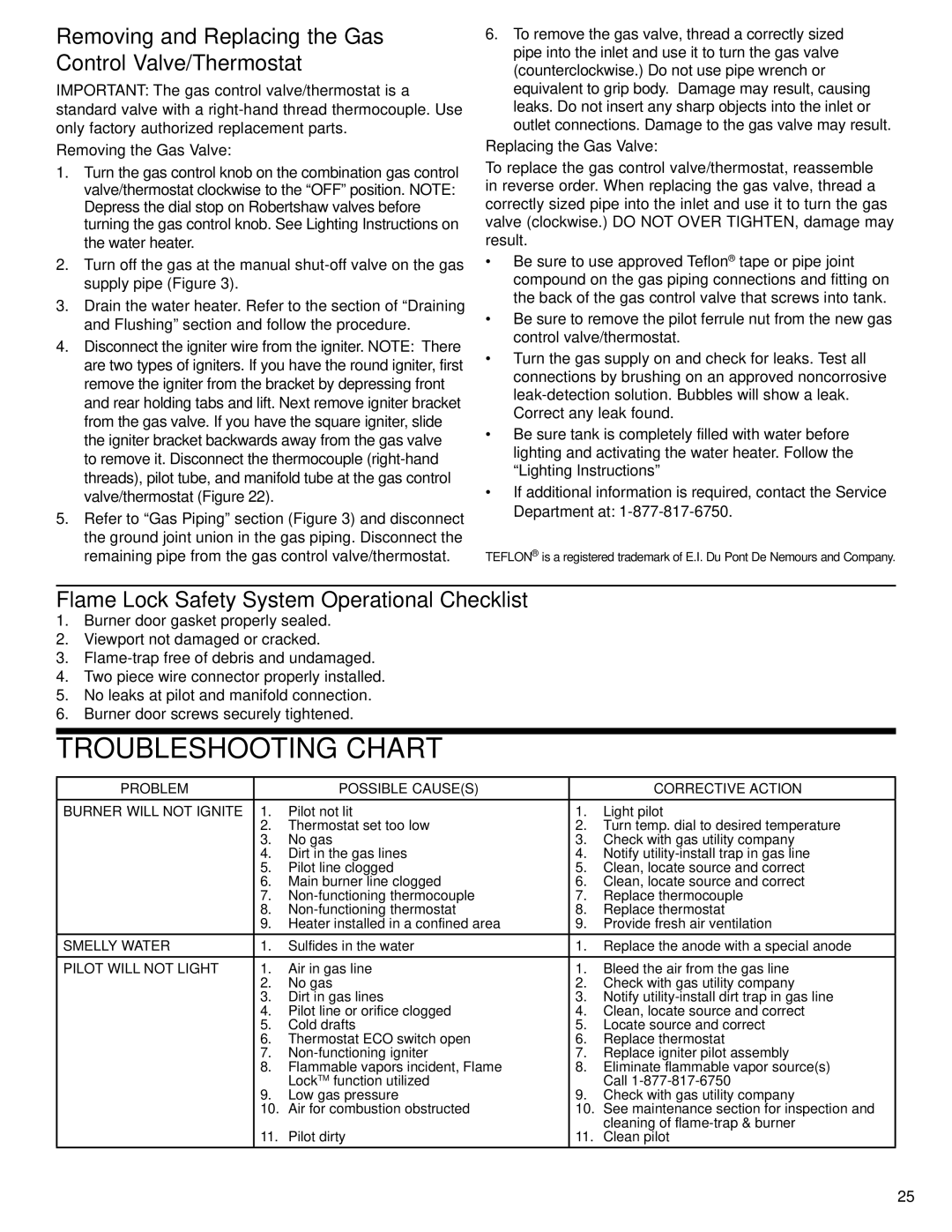
Removing and Replacing the Gas Control Valve/Thermostat
IMPORTANT: The gas control valve/thermostat is a standard valve with a
Removing the Gas Valve:
1.Turn the gas control knob on the combination gas control valve/thermostat clockwise to the “OFF” position. NOTE: Depress the dial stop on Robertshaw valves before turning the gas control knob. See Lighting Instructions on the water heater.
2.Turn off the gas at the manual
3.Drain the water heater. Refer to the section of “Draining and Flushing” section and follow the procedure.
4.Disconnect the igniter wire from the igniter. NOTE: There are two types of igniters. If you have the round igniter, first remove the igniter from the bracket by depressing front and rear holding tabs and lift. Next remove igniter bracket from the gas valve. If you have the square igniter, slide the igniter bracket backwards away from the gas valve to remove it. Disconnect the thermocouple
5.Refer to “Gas Piping” section (Figure 3) and disconnect the ground joint union in the gas piping. Disconnect the remaining pipe from the gas control valve/thermostat.
6.To remove the gas valve, thread a correctly sized pipe into the inlet and use it to turn the gas valve (counterclockwise.) Do not use pipe wrench or equivalent to grip body. Damage may result, causing leaks. Do not insert any sharp objects into the inlet or outlet connections. Damage to the gas valve may result.
Replacing the Gas Valve:
To replace the gas control valve/thermostat, reassemble in reverse order. When replacing the gas valve, thread a correctly sized pipe into the inlet and use it to turn the gas valve (clockwise.) DO NOT OVER TIGHTEN, damage may result.
•Be sure to use approved Teflon® tape or pipe joint compound on the gas piping connections and fitting on the back of the gas control valve that screws into tank.
•Be sure to remove the pilot ferrule nut from the new gas control valve/thermostat.
•Turn the gas supply on and check for leaks. Test all connections by brushing on an approved noncorrosive
•Be sure tank is completely filled with water before lighting and activating the water heater. Follow the “Lighting Instructions”
•If additional information is required, contact the Service Department at:
TEFLON® is a registered trademark of E.I. Du Pont De Nemours and Company.
Flame Lock™Safety System Operational Checklist
1.Burner door gasket properly sealed.
2.Viewport not damaged or cracked.
3.
4.Two piece wire connector properly installed.
5.No leaks at pilot and manifold connection.
6.Burner door screws securely tightened.
TROUBLESHOOTING CHART
PROBLEM |
| POSSIBLE CAUSE(S) |
| CORRECTIVE ACTION |
BURNER WILL NOT IGNITE | 1. | Pilot not lit | 1. | Light pilot |
| 2. | Thermostat set too low | 2. | Turn temp. dial to desired temperature |
| 3. | No gas | 3. | Check with gas utility company |
| 4. | Dirt in the gas lines | 4. | Notify |
| 5. | Pilot line clogged | 5. | Clean, locate source and correct |
| 6. | Main burner line clogged | 6. | Clean, locate source and correct |
| 7. | 7. | Replace thermocouple | |
| 8. | 8. | Replace thermostat | |
| 9. | Heater installed in a confined area | 9. | Provide fresh air ventilation |
SMELLY WATER | 1. | Sulfides in the water | 1. | Replace the anode with a special anode |
PILOT WILL NOT LIGHT | 1. | Air in gas line | 1. | Bleed the air from the gas line |
| 2. | No gas | 2. | Check with gas utility company |
| 3. | Dirt in gas lines | 3. | Notify |
| 4. | Pilot line or orifice clogged | 4. | Clean, locate source and correct |
| 5. | Cold drafts | 5. | Locate source and correct |
| 6. | Thermostat ECO switch open | 6. | Replace thermostat |
| 7. | 7. | Replace igniter pilot assembly | |
| 8. | Flammable vapors incident, Flame | 8. | Eliminate flammable vapor source(s) |
| 9. | LockTM function utilized | 9. | Call |
| Low gas pressure | Check with gas utility company | ||
| 10. | Air for combustion obstructed | 10. | See maintenance section for inspection and |
| 11. | Pilot dirty | 11. | cleaning of |
| Clean pilot |
25
